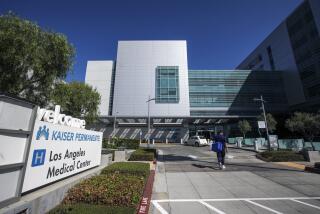Urgent Care: High Risk Under High Pressure
- Share via
In listing the arbitration awards against Kaiser emergency room services between 1995 and 2001, your report in every case names the HMO as being responsible (“Cases Reveal Lapses in Kaiser Emergency Care,” Jan. 2). Going through the brief description of all nine cases listed, it is clear that every case represents a medical malpractice on the part of the emergency room physician or personnel. Even the patients’ attorneys do not claim the existence of systemic problems with the care.
Short of reviewing the medical malpractice cases of a comparable number of emergency room services not operated by Kaiser, it is not possible to draw any conclusion regarding lapses in care at this HMO.
The emergency room in any setting is a high-pressure environment and the personnel working there occasionally make mistakes that can have tragic consequences.
I have never worked for Kaiser Permanente or another HMO.
Gabor Tamasi MD
Malibu
*
Re “Repair, Don’t Merely Bandage, Health Care,” Commentary, Dec. 28: Few people realize that in California, hospitals and doctors are struggling to survive. I’m not only talking about trauma centers and emergency rooms. Your community hospital and local doctor or surgeon could soon face extinction.
Yes, many hospitals are building and expanding. It’s not that they are doing financially well. Most of it is because of government mandates and new earthquake codes forcing the hospitals to conform or face closure.
As more money is channeled into cement walls, less and less money exists to replace aging machines and equipment and invest in new technology helpful to the public.
And, of course, hardly any money goes to improve the quality of care, such as hiring more nurses, therapists and aides in order to have better staffing, which is now dismally dangerous. An occasional minor pay raise is given to the nurses chiefly to silence them about some critical staffing issues and in the hope that they won’t go elsewhere.
All doctors, but especially surgeons, have been price-fixed by managed care, Medicare, Blue Cross, etc., into accepting intolerably low reimbursements for services rendered. Another 5.5% cut in reimbursements takes place this month. New doctors are taking up residence in other states and some of the finest surgeons and doctors have moved or retired because they cannot afford to keep their offices open.
When you get sick today, tomorrow or in five years, it will be too late to say: How and when did this happen? Why are there so few good doctors and hospitals around? Why do I have to go across the city for that test? Or to another state for my operation?
Ambrose S. Masto MD
Burbank






